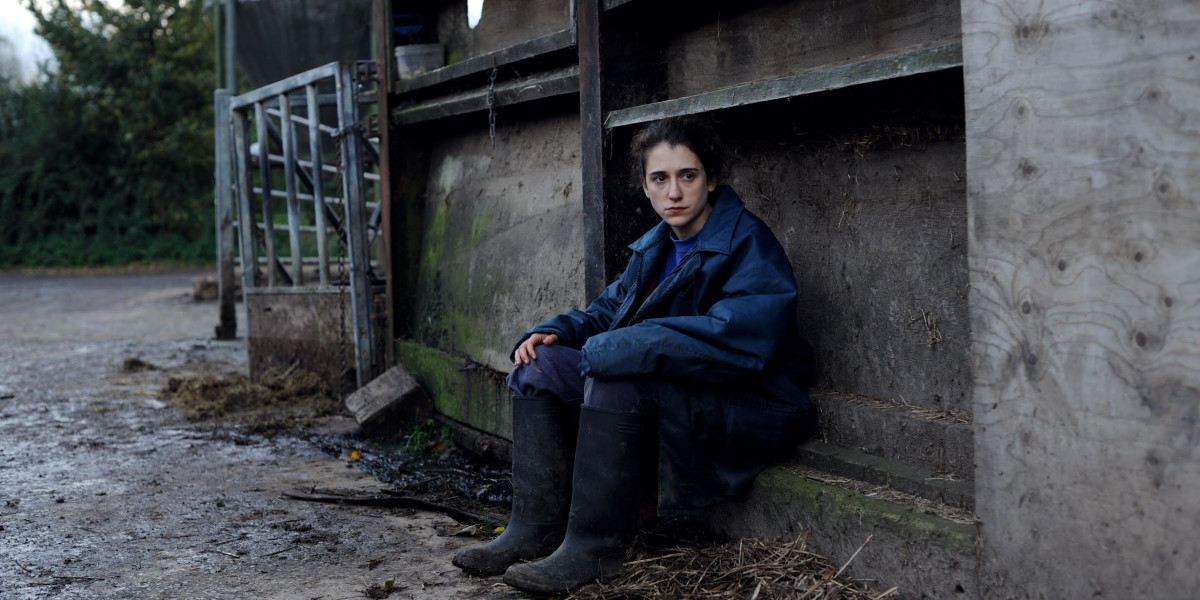Monday, 8 May 2017
In Hope we trust: "The Levelling"
Industry expectations are high for Hope Dickson Leach, the emergent British writer-director who back in October became the first recipient of the IWC Bursary Award, presented in association with the BFI. She's certainly earned the £50k chunk of change that was handed over on the eve of last year's London Film Festival: her debut undertaking The Levelling is a thoroughly assured, immensely promising piece that finds a rich dramatic analogy for all male-female relations in a perilously tricky reunion between a father and his daughter. What Leach describes here is a homecoming where the home in question is in a state of considerable physical and emotional disarray. Nervy trainee vet Clover (Ellie Kendrick) has been recalled to the family farm in one of those rural communities sorely hit by recent rounds of flooding and austerity measures; there, she finds the farmhouse rendered all but uninhabitable, her childhood dog locked up in a barn with its own turds, and her brother no more, killed by a shotgun blast to the face. Her bluff, withholding father Aubrey (David Troughton), an erstwhile military man, shrugs off his boy's death as a bloody stupid accident before shuffling off to deal with the livestock, while Clover, who has devoted her young life to the provision of care, is left picking up the pieces, and figuring out what went wrong.
With notable economy, Leach establishes a contrast between the way this man and this young woman respond to this moment of crisis. Both have been bereaved, yet only one of them is allowing themselves to feel the loss, and she's the one having to do all the cleaning up. Subtly, The Levelling begins to suggest the different kinds of work required to keep any household functioning - the first half is a little of that feminist landmark Jeanne Dielman... carried off to the countryside - though from its opening tableau of a rural road, showing us the banner urging the authorities to dredge a river, and the river that needs dredging, it brims with agricultural specificity. You sense that Leach isn't some posturing city type who's rocked up in Somerset with the best of intentions but no idea how farms actually operate; she's committed to the everyday details of this environment, lingering as Clover wipes down a cow's udders in advance of attaching the milking machine. Her heroine gets scarce thanks for her labours, however, and Leach is keen to show how the things the men around Clover do say impact upon this most sensitive of protagonists. "Don't be such a girl," she's told after turning down a drink, and yet, at Aubrey's makeshift dining table, father implores daughter to serve with a telling "you be Mum". (This family's lopsidedness goes a long way back.)
At the same time, there are traces of a Gothic mystery in here: the ramshackle house containing plentiful evidence that something terrible has happened, the young woman poking about inside the dishevelled world of men. Clover literally inherits the keys to this tumbledown kingdom; she begins digging in the dirt and nosing around the attic, and gradually comes to uncover what her brother's death has to do with the sale of the livestock and the fate of the local badgers. That may sound borderline absurd, particularly to city dwellers who've never had to contend with a TB outbreak, but the compelling Kendrick holds these diverse lines of inquiry together: you find your heart going out to Clover, determined as she is to save everyone and restore at least this small part of her past to working order, in the face of men who'd far rather torch or shoot it. When Aubrey begins to reassert his control, we see the effect writ large on the actress's face: she too grows colder, less caring, at one point literally retreating into the darkness. There is a lot of darkness for Clover to retreat into here - the farm makeover can only get so far within cinematographer Nanu Segal's carefully muted palette - and you can, in places, feel The Levelling succumbing to that strain of dour rural miserablism that sunk 2014's Brit indie Catch Me Daddy. Yet its vision of how the sexes talk to and rub up against one another has stayed with me, and its final watershed is very moving indeed. Even at times of turmoil and outright despair, hope - and Hope - persists.
The Levelling opens in selected cinemas from Friday.
Subscribe to:
Post Comments (Atom)

No comments:
Post a Comment